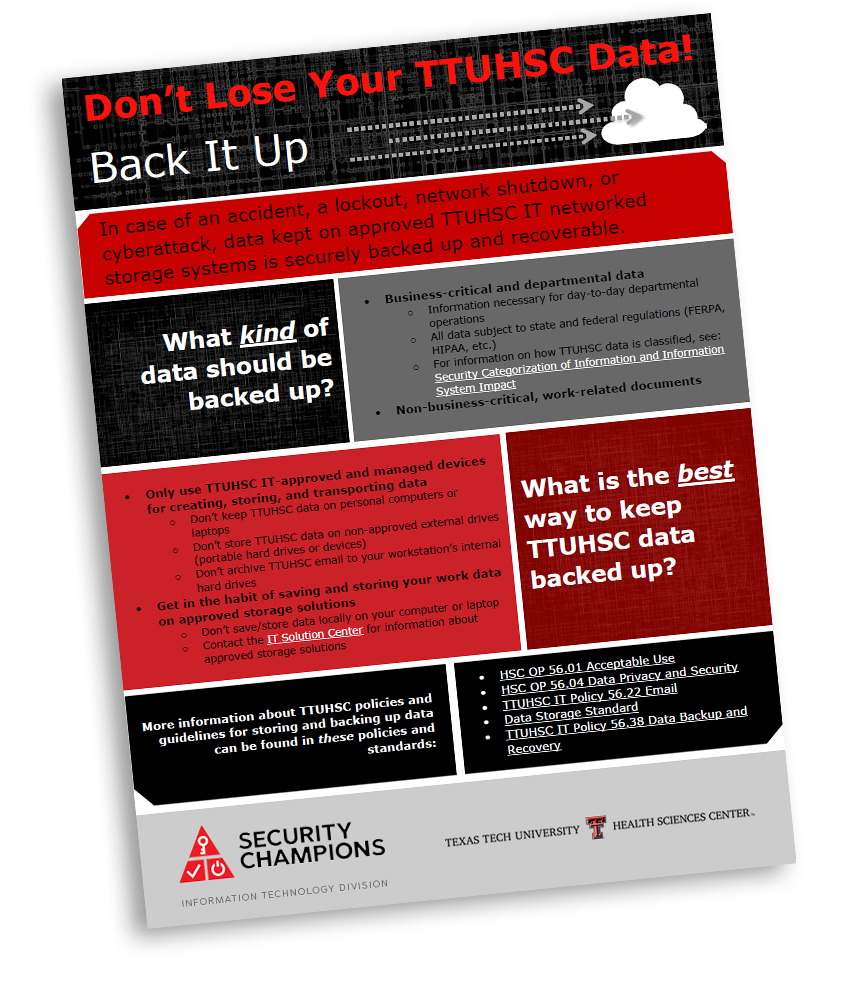IT Special Initiatives
Security Champions
The Special Initiative department supports the Information Technology (IT) division in projects that bridge the gap between specialized IT knowledge and every day user IT cybersecurity awareness. By leveraging volunteer staff and faculty, universities can build a more robust cybersecurity culture, raise awareness, and strengthen their overall security posture.

What is expected of champions?
- Support the initiatives of the security team by promoting campaigns, answering peer questions, and distributing information.
- Build personal IT security knowledge by attending calls and meeting and keeping up to date with information.
- Share experiences and insights with department employees and IT Security team.

Data Storage and Backup: Keeping Your Information Safe
Data storage and backup are crucial for protecting your sensitive information. Our informational flyers provide essential tips and guidelines, along with TTUHSC's official policies. Follow these recommendations to ensure the security and integrity of your data.
August Informational Flyers

Cybersecurity: From Zero to Hero
Emails are a prime target for cybercriminals. They can be used to launch various attacks, including:
PHISHING: Deceptive emails designed to trick users into revealing personal information or clicking malicious links that can download malware.
- Avoid links in suspicious emails or texts.
- Don't share info like passwords or bank details.
- Watch for typos and weird urgency in messages.
- If you suspect a phish, report it.
MALWARE: Emails can contain attachments infected with malware that can steal data, damage systems, or hold them hostage with ransomware.
- Update software: patch malware holes.
- Antivirus: your shield against infection.
- Click: only on expected links and downloads.
- Strong passwords: keep them secret.
A library of information specifically geared towards all IT topics.
Why Cybersecurity Advocacy?
- Grassroots Awareness: Security Champions can reach a wider audience than centralized IT departments, fostering a campus-wide understanding of cyber threats.
- Peer-to-Peer Learning: Students and faculty trust and relate more easily to peers who explain cyber security concepts. This creates a more approachable learning environment.
- Cost-Effective Outreach: Security Champions can supplement professional IT staff, allowing them to focus on more complex security matters.

- Identifying Vulnerabilities: Faculty and staff Security Champions can be the first to notice suspicious activity within their departments due to their familiarity with everyday practices.
- Promoting Best Practices: Security Champions can encourage secure habits like strong passwords and multi-factor authentication, which lead to a more secure university network.
- Building a Security Community: A network of Security Champions can share information and best practices, fostering collaboration and a proactive security posture.

- Skill Development: Security Champions gain valuable cybersecurity knowledge and experience, which can lead to advancement and opportunity.
- Leadership & Mentorship: Security Champions can develop leadership skills by educating others and acting as mentors on cybersecurity issues.
- Campus Contribution: Security Champions have the satisfaction of contributing to the safety and security of our TTUHSC community.


